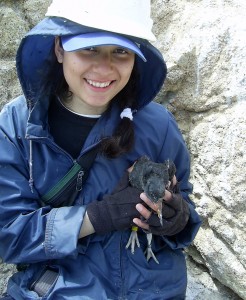Alys Granados

MSc. Student
Contact Information
Department of Biology
Concordia University (Loyola Campus)
7141 Sherbrooke St. W. H4B 1R6
Montreal, QC, Canada
Office: SP301.16
Lab: SP434
(514) 848-2424 (ext. 4021)
Education
2009- 2011: Biology Graduate Student at Concordia University
2008- 2009 Non degree studies in Ecology & Evolutionary Biology, University of Toronto
2003- 2007 Honours BSc. Zoology, BA minor in Environmental Studies, University of Guelph
My Project
Human-elephant conflict and elephant movement patterns in the Bénoué Wildlife Conservation Area, Cameroon
Background
Human wildlife conflict (HWC) is a global problem not only for threatened species, but for humans as well. It occurs wherever humans and wild animals live in close proximity to each other, and is the case for those living in communities that border national parks and wildlife preserves, such as the Bénoué Wildlife Conservation Area, Cameroon. In this region, agriculture is typically the primary or only source of income but production may be reduced or completely destroyed by the crop raiding behaviour of African savannah elephants, Loxodonta africana. Such negative interactions can result in unfavourable attitudes towards elephants as well as the national park as a whole. In West and Central Africa, elephant populations are thought to have been declining over the past 30 years. Management and conservation strategies must therefore involve local communities by considering these attitudes in addition to the patterns in crop raiding behaviour.
Field work
This project is in collaboration with the World Wildlife Fund (WWF) North Sudanian Savannah Program (NSSP). Field work for this project took place in summer 2010 and involved traveling to communities in the Bénoué Wildlife Conservation Area (BWCA) located in the North province of Cameroon. Villagers were surveyed on their resource use and interaction with wildlife from the park. Crop damage reports from villages throughout the conservation area and GPS locations for elephants during the 2007-2009 period are available (from WWF) and will be also be used for this project.
Objectives
-
To identify how environmental factors (ie vegetation type, water sources, roads) influence elephant movement within the BWCA.
-
To examine seasonal, annual, and temporal trends in crop raiding behaviour by wildlife, including elephants and determine whether elephants in this area show a preference for specific crops.
-
To survey the attitudes of villagers towards Bénoué National Park, hunting concessions, elephants, and other wildlife, in addition to their perception of the trends in crop raiding behaviour and elephant population growth.
Publications
A. Granados & R.B. Weladji (2012) Human-elephant conflict around Bénoué National Park, Cameroon: Influence on local attitudes and implications for conservation. Human Dimension of Wildlife 17:77-90.
A. Granados, R.B. Weladji & M. Loomis (Accepted on May 3rd, 2012) Movement and occurrence of two elephants herds in a human-dominated landscape, Bénoué Wildlife Conservation Area, Cameroon. Tropical Conservation Science 5: 150-162.
A. Granados, R.B. Weladji. (2011). Human-elephant conflict in the Bénoué Wildlife Conservation Area, north Cameroon: Implications for conservation. Annual Meeting of the Canadian Society for Ecology and Evolution, May 12-15, 2011. Banff, Alberta, Canada (Page 194; poster)
A. Granados, R.B. Weladji. (2010). Local attitudes and crop raiding by wildlife: implications for elephant conservation from Bénoué Willdife Conservation Area, Cameroon. Societe Quebecoise pour l’edtude biologique du comportement. November 5-7, 2010, Montreal, Quebec, Canada (Page 26; oral presentation)